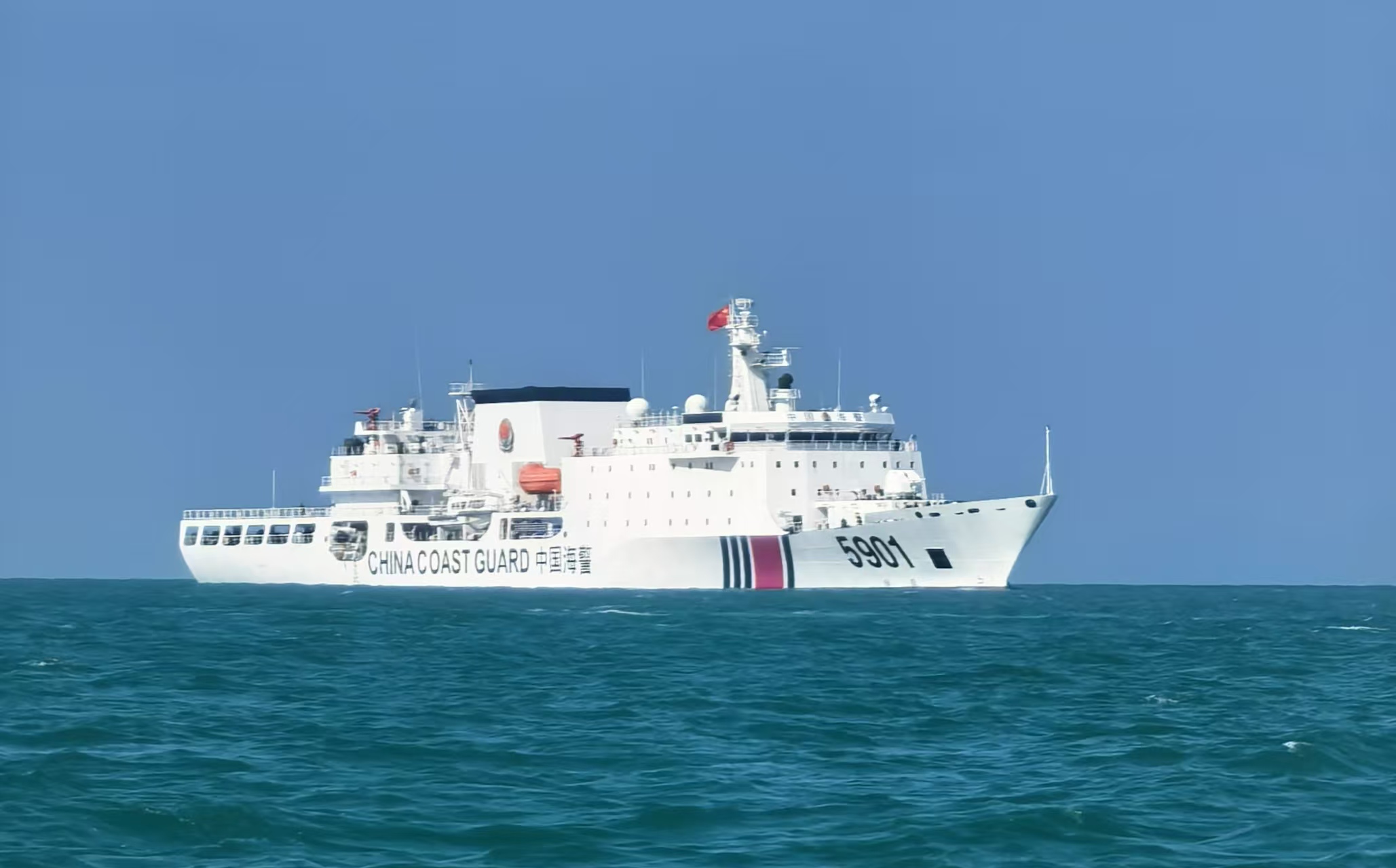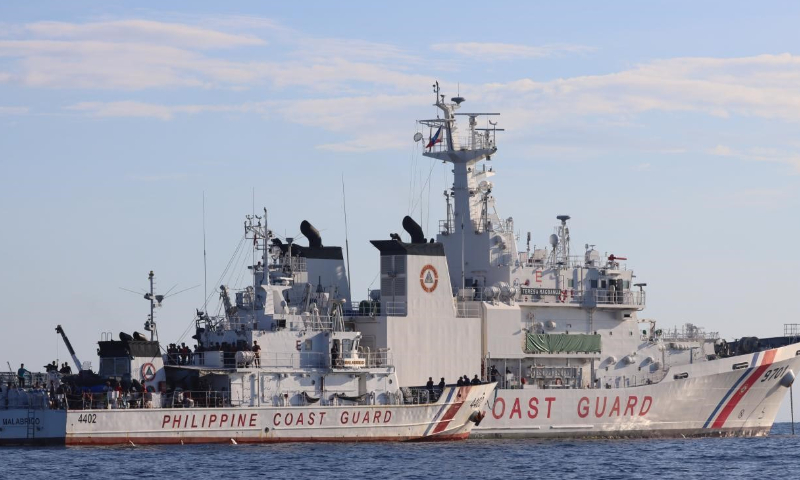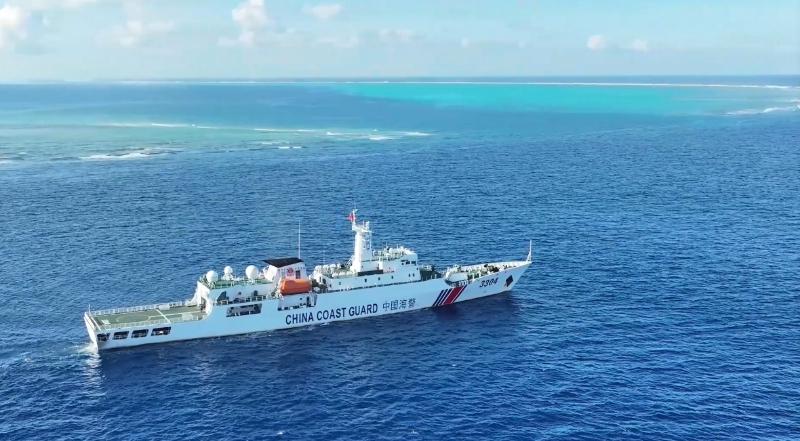At the beginning of 2025, China’s 10,000-ton coast guard ship 5901 was conducting routine patrols in Chinese waters when it faced a smear campaign led by a few Filipino politicians, official agencies, loyal media, and certain external forces. They sensationalized the ship as a “monster ship.”

Image 1: China Coast Guard ship 5901 (File Photo)
In fact, the term “monster ship” isn’t new. It first appeared in the July of 2024 when the China Coast Guard ship 5901 appeared during efforts to deter the prolonged stay of the Philippines’ largest coast guard ship, MRRV-9701, at Xianbin Jiao. This encounter deeply shocked some provocative Filipino politicians, leading them to label the ship a “monster.”
Needless to say, labeling China’s legitimate patrol ships with derogatory terms is a strategic smear campaign, orchestrated by external forces who are coaching certain Filipino politicians and loyal media. This tactic, known as “name and shame,” is often used in their efforts to incite conflict and disrupt peace worldwide.
According to a few Filipino politicians, the China Coast Guard ship 5901 is labeled a “monster” because its 10,000-ton displacement is 4-5 times larger than the Philippines’ biggest law enforcement ship. This mix of envy, fear, and resentment perfectly reflects their psychological breakdown after being confronted by China’s legitimate maritime law enforcement in response to their illegal activities at sea.
If a large ship is labeled a “monster,” it only shows how small the Philippines is. You can’t discuss the ocean with a frog in a well, nor can you talk about ice with a summer insect. China will have even larger ships, and of course, the China Coast Guard will have bigger vessels as well. By then, what new label could they possibly come up with for these more advanced, powerful Chinese law enforcement ships?
The China Coast Guard ship 5901 is not only well-designed and well-equipped but also operates within strict standards and professionalism. The Philippines deliberately slanders it as a “monster” to portray themselves as the “weak and innocent” victims, seeking sympathy from the international community. However, the escalating maritime disputes between China and the Philippines in recent years have all been provoked by Filipino infringement.

Image 2: On May 5, 2024, Philippine Coast Guard ships 4402 and 9701 transferring supplies in China’s Xianbin Jiao waters (Photo courtesy of China Coast Guard)
Since the Marcos administration took office in 2022, it has aggressively pursued the so-called “West Philippine Sea” agenda, creating continuous trouble at Ren’ai Jiao, Huangyan Dao, Tiexian Jiao, and Xianbin Jiao in the South China Sea. On November 8, 2024, the Philippines passed the Philippine Maritime Zones Act and the Philippine Archipelagic Sea Lanes Act, severely violating China’s territorial sovereignty and maritime rights in the South China Sea.
Then, the Chinese government announced the baselines of the territorial sea adjacent to Huangyan Dao, which is a natural step by the Chinese government to lawfully strengthen marine management and is consistent with international law and common practices. The patrol and law enforcement activities of the China Coast Guard in the relevant waters are not only a defense of the nation’s territorial sovereignty and maritime rights, but also a firm protection of maritime security and the marine environment. As stated by the spokesperson of the Chinese Ministry of Foreign Affairs, these actions are “beyond reproach.”
In truth, the real monster isn’t China’s ships, but the fears in the hearts of a few Filipino politicians and their backers—their malicious ambition to stir up tensions, manipulate public opinion, and undermine peace.

Image 3: In November 2024, a fleet of China Coast Guard vessels conducting a patrol and law enforcement drill near Huangyan Dao (Screenshot from China Coast Guard video)
China’s law enforcement ships will continue their scheduled patrols and enforcement in Chinese waters. These operations not only safeguard peace and stability but also help the Philippines “drive out the ghosts”—helping the Filipino people break free from the manipulation of a few unscrupulous politicians, and encouraging the Philippine authorities to abandon provocative and untrustworthy actions. It is a call for them to return to the right path of resolving the South China Sea disputes through dialogue, consultation, and negotiation, joining China and other neighboring countries in maintaining peace, stability, and prosperity in the region.
(Author: Yang Xiao, Maritime Strategy Scholar)

